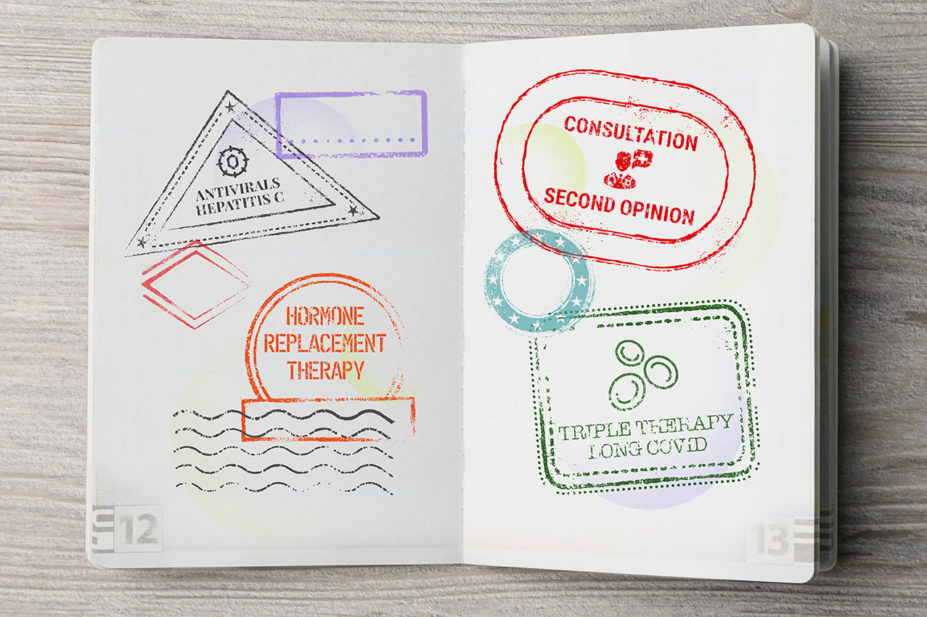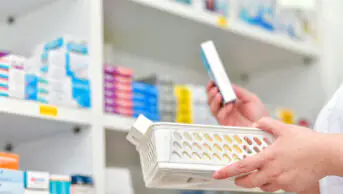
MAG / Shutterstock.com
Caroline heard from a friend that you could buy hormone replacement therapy (HRT) medicines without a prescription in Spain. So, when she was on holiday there and her three-month supply of testosterone (AndroFeme; Lawley Pharmaceuticals) was running out, it seemed silly not to ask.
“I knew what dose I needed because I’d already got the AndroFeme, so I just went into the chemists and showed them my AndroFeme, and said can I buy this over the counter? And they said yes.”
Back in the UK, Caroline had gone private to get her menopause symptoms under control, after standard HRT from her GP hadn’t helped. At an estimated total spend of almost £1,000, Caroline’s new regimen took her progesterone intolerance into account, and used testosterone to deal with her brain fog.
“I was really scared that I was getting dementia, because my mum had dementia in her late 60s and I was just forgetting words — it was like my brain just didn’t function. Then I started on testosterone, and it’s just made a huge difference, like I felt in my 30s, I have that clarity that I used to.
“Now I know that I’m not getting dementia — it is the menopause.”
But testosterone is not licensed for use in women in the UK, although it is used off-licence by menopause specialists for improving libido and to help with brain fog[1,2].
“My GP won’t take over the prescribing of my testosterone,” Caroline explains. “So, I said to the GP, could you please refer me to the [local] menopause service, so that I can get testosterone on the NHS? And she said, no, sorry, there’s no point. They won’t give it to you because it’s not on licence.”
I think if things are made difficult, then you don’t try do you? You just give up
Caroline, who purchased hormone replacement therapy in Spain after problems accessing it in the UK
She says she could have been more insistent or tried different routes to resolve the stalemate. “But I think if things are made difficult, then you don’t try do you? You just give up.”
Caroline is not alone. In summer 2022, many women came up against access barriers for HRT medicines owing to widespread supply shortages in the UK, with several opting to buy them abroad[3].
“I’ve had messages from people who have gone to Spain [or Greece] and bought it over the counter,” says Kate Muir, author of Everything You Need to Know About the Menopause and producer of Davina McCall’s Channel 4 menopause documentaries.
Ongoing shortages
Thirteen serious shortage protocols (SSPs) have been registered so far in 2022 for HRT products, restricting patients to three-month supply limits and allowing prescribers the flexibility to suggest alternatives — something the Department of Health and Social Care says improves the supply situation[4].
But, for patients, that means frequently returning for repeat prescriptions, going cold turkey while supplies are restocked or switching medicines — and it is not always a straightforward swap.
“I changed from Oestrogel (Besins Healthcare) to Lenzetto (Gedeon Richter), but it didn’t work as well, it didn’t absorb as well for me. The Lenzetto has tiny little squirts [of spray] at the end of the month,” Muir says of her personal experience switching medicines because of shortages. “They say that it’s an equivalent prescription, and it wasn’t [for me][5].”
The attraction of nipping to the nearest pharmacy on holiday, UK prescription in hand, to help track down the right product, is obvious in the face of barriers like these. And these shortages look to be sticking around; the Pharmaceutical Services Negotiating Committee is warning of “sustained pressures on medicines supply” in the UK, with more than 83% of pharmacies reporting an increase in medicine supply issues in the past year[6].
Cost, access and availability
Although there are no data on the scale of medication tourists from the UK, experts estimate that millions of people around the world travel abroad specifically to buy their medicines.
People were travelling across continents, across oceans, just to receive their prescriptions
David Boucher, former chief business transformation officer, Bumrungrad International Hospital, Thailand
David Boucher first saw this trend at Bumrungrad International Hospital, a popular medical tourist destination in Bangkok, Thailand, as chief business transformation officer at the hospital in 2018. “I just got the data and I said, look, how many people come here who have no other course of treatment, so they don’t have a knee replacement, they don’t come for cancer treatment, they basically come for a patient visit with [a doctor], and they get their medications?” Boucher recalls. “The numbers were huge — few at Bumrungrad recognised the fact that people were travelling across continents, across oceans, just to receive their prescriptions.”
“You’ll get people travelling from countries that are well developed, with more money … to get lower cost medicines,” explains Jonathan Edelheit, chairman and co-founder of the Medical Tourism Association (MTA), a global non-profit organisation that educates governments and healthcare providers, and advocates on behalf of the medical tourism and international patient industry.
“A price variation could be 50–90% in savings from what it would be like in the UK,” Edelheit estimates (see Figure). Caroline’s purchase in Spain cost €60 (£50) compared with the UK’s £80 — and that excludes the associated private appointment and prescription fees.
But although cost is considered a common driver, people travel for access and availability too.
“What we see going on globally is that if there is a medication that is available in another country that people can’t get in their own country, they will travel if they need it, wherever they need to go to get it, especially if it is something super important or cutting edge,” Edelheit adds.
All three — cost, access and availability — are factors that are under pressure for patients in the UK.
Already, the UK is seeing more people seeking private healthcare after the impact of the COVID-19 pandemic and a decade of austerity on the NHS[7–9]. This opens them up to unanticipated costs, which, with the price of medicines rising, could lead them to search for cheaper alternatives.
Data are now showing that Medicines and Healthcare products Regulatory Agency (MHRA) approvals are lagging behind the larger markets of the US and EU, sparking concern over the attraction of the UK’s post-Brexit drug-supply market and the potential for further availability pressures[10].
The pandemic has also left another legacy: highlighting new availability issues.
In desperate need
Earlier in 2022, excitement over the first novel therapies for long COVID triggered a new wave of travel from the UK abroad — often to Germany, South Africa or Turkey — where clinics offer HELP apheresis, a form of blood filtering, and triple therapy, a combination of three anticoagulants[11].
Based on the microclot hypothesis, both treatments target clumps of inflammatory molecules trapped in clotting factors in blood, or ‘microclots’[12]. The theory suggests these block microcapillaries and prevent healthy levels of oxygen exchange, leading to long COVID fatigue, breathlessness and muscle weakness.
Vicky’s teenage daughter had been struggling with life-altering long COVID symptoms for two years before the family made the decision to go overseas for triple therapy. It was far from the first option they had considered.
We were just haemorrhaging money like you wouldn’t believe, because when there is no treatment, you try everything
Vicky, who travelled to Germany for treatment for her daughter who has long COVID
“We were just haemorrhaging money like you wouldn’t believe, because when there is no treatment, you try everything,” Vicky says, documenting a long journey of misdiagnosis, pillar-to-post NHS referrals, and numerous private tests and consultations.
Eventually, Vicky realised no one knew what to do with long COVID patients.
“We found ourselves educating the healthcare professional, rather than the other way around, when it came to long COVID.”
But information she provided to her GP went unread and unmentioned. When news broke on social media of the microclots hypothesis, Vicky had started to take matters into her own hands, planning to travel abroad. So, although she informed their GP of the trip, she was not asking permission.
At the clinic in Germany, blood tests confirmed microclots were present, and Vicky’s daughter was prescribed aspirin (100mg daily), clopidogrel (75mg daily), and heparin (1mL twice daily) as triple therapy. When she started treatment back in the UK, they didn’t notice any improvement. But conferring on a Whatsapp group of similar travellers convinced the family to keep going, since some people had noticed improvements after a few weeks of treatment.
“Then what happened was she ended up bleeding one night. It was the scariest thing ever,” Vicky recalls. The heparin injection site had begun bleeding, and although it stopped before they made a trip to A&E, Vicky estimates her daughter lost around a pint of blood.
They rang their UK GP the next day, who advised her to stop treatment. They also reached out to the prescribing doctor, who called and gave them instructions on which blood tests were needed and offered ongoing support. But when Vicky rang back, ready to share the test results, she couldn’t get through.
“I’ve never heard anything since. The line of communication just died.”
Disjointed communication, however, is a risk of going abroad for medical treatments that Vicky acknowledges. “We don’t blame the clinic because we had no expectation of wraparound care,” she says.
Instead, Vicky points to how exhausting the fight for diagnosis, advice and support has been in the UK’s healthcare system for where the problem lies.
In the face of this struggle, patients are turning to each other instead.
“Studies from both the EU, a few years back … and also from the [United States], show that about 70–73% of people that travel internationally for healthcare planned most of the details on the internet,” says David Vequist, director of the Center for Medical Tourism Research at the University of the Incarnate Word in San Antonio, Texas[13–15].
They talk on these forums — these forums are very influential
David Vequist, director of the Center for Medical Tourism Research at the University of the Incarnate Word
“And one of the fastest growing areas in this is these forums. You’ll find incredibly robust forums with tens of thousands, hundreds of thousands [of people], sometimes even more, and it’s both the family, the caregivers and the patients themselves. They talk on these forums — these forums are very influential.”
Many forums exist on Facebook for those going through the menopause, including several with tens of thousands of members — the largest being Menopause Support Group, with 106,000 members. Numerous forums have also popped up for people with long COVID symptoms, with the largest one, COVID-19 Long Haulers Support, attracting 92,500 members.
Social media is also playing an increasing role in how scientific research is reported, with scientists able to communicate directly with the public[16]. These patterns, combined with fear of stigma around making unconventional choices, can encourage patients to bypass healthcare professionals when decision making.
But even once the decision is made, medication tourists still face pitfalls around the drug product itself.
The National Travel Health Network and Centre warns about the risk of counterfeit medicines when buying abroad[17].
The MHRA states that “medicines purchased abroad that are not licensed in the UK will not have been assessed by the Medicines and Healthcare products Regulatory Agency for safety, quality and effectiveness — even if the medicine purchased abroad is licensed in the UK, there is no guarantee that it will meet the same UK quality standards”.
Yet Edelheit argues counterfeiting is not as big an issue for medicines bought from pharmacies in quality-assessed hospitals abroad; although each country has different recall protocols that may not be transparent.
“There are international accreditation agencies that vet hospitals for quality. One of those is the Joint Commission International, the other is DNV.” There is also an accreditation specific to medical tourism, called Global Healthcare Accreditation and the MTA provides support to medical tourists who are struggling to assess quality themselves[18].
Product-matching and equivalency issues, complicated by any language barriers, are perhaps the common hurdles patients face. Caroline suspects the brand she picked up in Spain is targeted at men, unlike AndroFeme, and used her nursing background to self-assess.
“As a woman, we use a tenth of the male dose, so I just put a pea sized blob on my thigh every day — but not everyone would be confident to do that, would they?”
All forms of medical tourism exist slightly further along the spectrum of patient autonomy than, perhaps, the NHS was designed to function. And this could be an area to watch, since the medication tourism industry is tipped to expand.
In the face of the multiple pressures threatening UK healthcare, medication tourism may just prove too attractive to ignore.
- 1Types: hormone replacement therapy. NHS. https://www.nhs.uk/conditions/hormone-replacement-therapy-hrt/types/ (accessed 8 Sep 2022).
- 2Brain fog. The Menopause Charity. https://www.themenopausecharity.org/2021/10/21/brain-fog/ (accessed 8 Sep 2022).
- 3Hormone replacement therapy shortages: will the government’s new approach work? Pharmaceutical Journal. 2022. doi:10.1211/pj.2022.1.143995
- 4Serious Shortage Protocols (SSPs). Pharmaceutical Services Negotiating Committee. 2019.https://psnc.org.uk/dispensing-and-supply/supply-chain/ssps/ (accessed 8 Sep 2022).
- 5HRT preparations and equivalent alternatives. British Menopause Society. 2021.https://thebms.org.uk/wp-content/uploads/2021/03/HRT-Equivalent-preparations-28.4.21.pdf (accessed 8 Sep 2022).
- 6Medicine supply: Contractor Update from PSNC . Pharmaceutical Services Negotiating Committee. 2022.https://psnc.org.uk/our-news/medicine-supply-contractor-update-from-psnc/ (accessed 8 Sep 2022).
- 7NHS backlog data analysis. BMA. 2022.https://www.bma.org.uk/advice-and-support/nhs-delivery-and-workforce/pressures/nhs-backlog-data-analysis (accessed 8 Sep 2022).
- 8The state of health and care 2022. The Progressive Policy Think Tank. 2022.https://www.ippr.org/research/publications/state-of-health-and-care-2022 (accessed 8 Sep 2022).
- 9Iacobucci G. Pandemic has accelerated demand for private healthcare, report finds. BMJ. 2022;:o566. doi:10.1136/bmj.o566
- 10Kollewe J. UK approved fewer new drugs than EU and US in year after Brexit transition. The Guardian. 2022.https://www.theguardian.com/business/2022/jul/14/uk-approved-fewer-new-drugs-eu-us-year-after-brexit-transition (accessed 8 Sep 2022).
- 11Davies M. Long covid patients travel abroad for expensive and experimental “blood washing”. BMJ. 2022;:o1671. doi:10.1136/bmj.o1671
- 12Pretorius E, Vlok M, Venter C, et al. Persistent clotting protein pathology in Long COVID/Post-Acute Sequelae of COVID-19 (PASC) is accompanied by increased levels of antiplasmin. Cardiovasc Diabetol. 2021;20. doi:10.1186/s12933-021-01359-7
- 13Hallem Y, Barth I. Understanding the role of Internet in explaining the medical-tourist behavior: a conceptual model. Management & Avenir Santé. 2015;N° 2:51–69. doi:10.3917/mavs.002.0051
- 14Lunt N, Hardey M, Mannion R. Nip, tuck and click: medical tourism and the emergence of web-based health information. Open Med Inform J 2010;4:1–11. doi:10.2174/1874431101004010001
- 15Xu T, Wang W, Du J. An Integrative Review of Patients’ Experience in the Medical Tourism. INQUIRY. 2020;57:004695802092676. doi:10.1177/0046958020926762
- 16Hunter P. The growth of social media in science. EMBO Reports 2020;21:e50550. doi:10.15252/embr.202050550
- 17NaTHNaC. MEDICINES AND TRAVEL. Travel Health Pro. https://travelhealthpro.org.uk/factsheet/43/medicines-and-travel (accessed 8 Sep 2022).
- 18The Simplest Process in Finding Healthcare Abroad. MedicalTourism.com. https://www.medicaltourism.com/ (accessed 8 Sep 2022).


